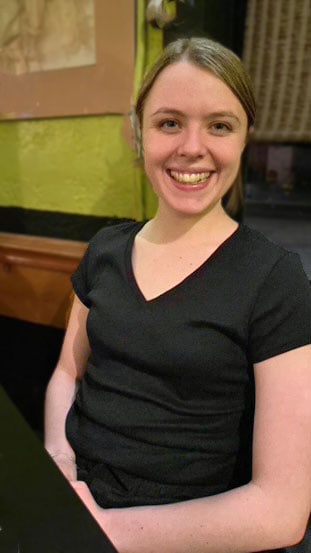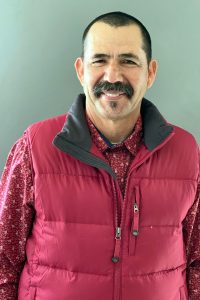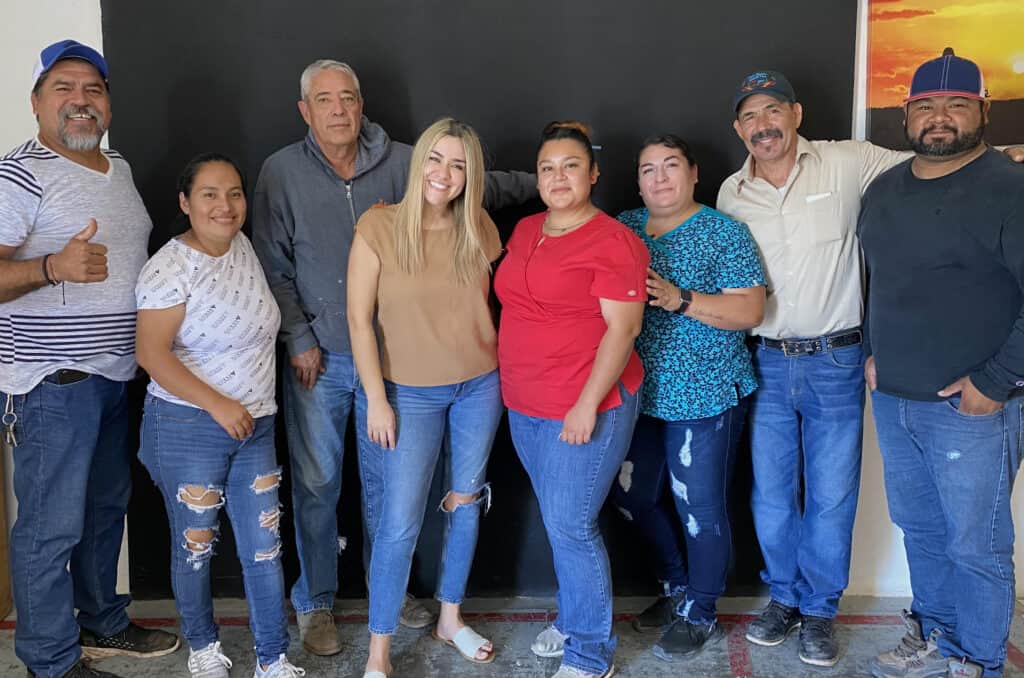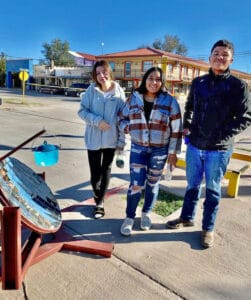
Peter Edmunds (left) and Dan Edmunds accepted a donation of used bicycles this month from The Bikeworks of Silver City, NM. The bicycles will enhance opportunities for exercise and improved health in Palomas.
On March 15, Border Partners founder Peter Edmunds was interviewed by Luke Moravec of Duluth, Minnesota’s 103.3 FM station about Border Partners’ sustainable technology mission. The interview is available on the station’s website. It’s transcribed below.
What did Minnesota want to know about what we’re doing in Palomas? Read on and see…
The Interview Transcription
Luke Moravec: It’s time now for Green Visions. Green Visions is a production of The North (103.3) to encourage green thinking and green actions. Green Visions is made possible by the Minnesota Power and Energy Conservation Program, making progress toward a lower carbon energy future.
And my guest today is Peter Edmunds working with Border Partners. Good morning, Peter!
 Peter Edmunds: Good morning, Luke.
Peter Edmunds: Good morning, Luke.
Luke: I asked you this earlier, but I want to hear this on the air: How are things in New Mexico right now?
Peter: Well, it’s going to be a bright sunny day, and I’m headed down to Mexico. We do a lot of donations of materials down here. I have 3,000 pounds of beans on a truck and trailer. With the pandemic and bad times in Palomas, there’s a lot of hungry people. So, that load will feed 30,000 servings of beans.
Luke: Wow…wow, well, you’ve got your checklist for the day, it sounds like. Thanks again for joining us on Green Visions. I just wanted to start out by noting that you are from the northland, but you have spent quite a bit of time in New Mexico. Get us up to speed a little bit with your work with Border Partners. How long has this been a part of your life and your routine?
Peter: My wife and I founded Border Partners in 2008. So, it’s coming up on 15 years old. We had retired several years before that and were looking for a long term volunteer activity. This sort of fell into place. It’s a nonprofit that does a lot of health, education, exercise, activity sorts of things. And then I–along with a lifelong interest in solar energy and alternative building methods–here I am. We’re no longer in the management of Border Partners, either Polly or me. But we both have projects that we are vitally interested in and actively managing.
Luke: Yeah, still driving trucks to locations where food is needed. So you still got some physical things to be doing around there. I want to talk a little bit about the communities where you’re working. What drew you to the locations specifically? I know that there are some specific needs that we’ll get into. But if you could, paint a picture for us: let us know a little bit about the communities where you are helping out.
Peter: Palomas is right on the border. The border wall goes right on the north edge of town all the way through, and it’s about 60 miles west of El Paso, Texas–that would be a big landmark down there. It’s a typically poor Mexican community. Like any country, communities on the edges of the country don’t get a lot of services from the government. So, it’s a kind of a neglected town with about four to five thousand people.
It’s in an agricultural area so there’s a lot of vegetables and cotton and beans and alfalfa grown. Most of the labor in this town is agricultural-related. So these men and some women make about $15-20 a day, working in the New Mexico sun. In the best of times–in the high season–they’re making $100/week or a little more. Food is really not much different in cost in Mexico, than regular supermarket food in the States.
Luke: Sure, sure. Go ahead.
Clean Groundwater
Peter: But there are problems that we deal with. In many arid regions of the world clean water is a major problem. And it is in Palomas. The groundwater here has arsenic, fluoride and nitrates in it–all naturally occurring. But it makes the water deadly to drink. You just shouldn’t. You can bathe with it, but you will not drink the water. So the town provides a reverse osmosis filter system. There are two locations where a family can get five gallons of water. But, one: they cost money and–two: they weigh something. A five gallon jug of water weighs 40 pounds. There are a lot of people who have trouble lifting 40 pounds…and carrying it: if they don’t have a car–they’re literally carrying it. I saw a senior citizen one day–a little tiny woman who couldn’t have weighed 100 pounds–and she’s carrying a 5 gallon jug of water down a long street going away from the water filter. I don’t know where she lived, but she would stop every block or so and set the jug down, walk around and flex her shoulders and then she’d go at it again.
Luke: If you’re just joining us, this is Peter Edmunds of Border Partners as part of Green Visions, who’s working in Mexico where people are carrying 40 pound water jugs to their homes from the town water filtration system. In what part were you a helpful component of that?
Peter: We did not directly help the town acquire their filtration system but we have developed other less expensive systems. We worked with a student at New Mexico State University about ten years ago. He was getting a degree in chemistry. One of his professors suggested to him that there was a way to make filters to take out arsenic and fluoride. He built a filter with just common pvc water pipe that will take out arsenic and fluoride and nitrates. We have put this filter in all the schools, kindergartens, and several churches in town so that the parishioners there can get good water and not have to carry it, maybe quite as far and not have to pay 25 cents a jug for it.
Luke: Kind of a grassroots effort then…?
Peter: And now we’re developing a “tech-sharing” page on our website, and the water filter will be part of that. So, if someone else around the world has a water problem that our filter is made for, they can look at the blueprints and look at the text. There’ll even be a video of some high school students making the filters. That’s a significant addition to the town.
Solar Energy
Luke: It would seem to be. So water filtration is one of the things that you’re doing. And you mentioned the hot New Mexico sun. All the same there’s also a need for solar heaters. Can you dive into that, too?
Peter: We have a solar heater that we developed some years ago. If you take my fancy little electronic temperature gauge and point it at a metal roof on a sunny day you can get up to 160 degrees temperature. So what we did was we took two sheets of metal roofing and spaced them about a 1/16 of an inch apart. We developed a little manifold of tubes.
Water from the reservoir is pumped up to the top of these two sheets of metal roofing and it flows down between them and gets amazingly hot.
It saves the family. They’ll have a 30-40 gallon tank of hot water every sunny day of the year and 90% of the days here are at least partially sunny. They are very rarely full cloudy days like there can be in Duluth, Minnesota. Those are a welcome addition to any family. They don’t have to buy propane to heat their own hot water. So it’s a major savings for them especially if you’ve got a family of little kids that need a bath every day or two. Or when they become teenagers they want a bath every day according to one of my friends who has three teenagers. So he’s very happy he’s got his water heater. And, again, that will go on the “tech share” part of our website. So if you want a solar heater any place in the world you can just look at that website.
We’re trying to reach beyond Palomas with our ideas. There’s so much need today because of climate change. So anything we can do to help avoid burning fossil fuels is a significant addition.
The kids that I work with are doing things…we’re just starting a project where we’re going to take newspaper, cardboard and grind it up and put it in a hold with some cement and make a building block out of that. It’s called papercrete. I’ve worked with that for more than 20 years. My house I’m sitting in right now has an addition on it that’s built of papercrete.
The nice thing about papercrete down here is that the town here has an old fashioned dump. I grew up in Western Minnesota. When you went to the dump you threw it in a hole in the ground and every once in a while, when the hole got filled, you just threw a match in it and burned everything. That is what this town has. In the US you can’t burn at dumps anymore.
Paper and clothes and wood and everything that people throw away–that’s the same toxic cloud that the US military is having problems with with half a million men–former soldiers– who come home with respiratory problems. That’s what the army does with the trash where these guys are defending the United States in Afghanistan and Iraq.
Luke: And Peter, with the time we have left I just want to get the information out there–to make sure that people know where to go to get the information. Where is the website?
Peter: The website is borderrpartners.org –all small letters. We’re happy to hear from you.
Luke: Absolutely. Peter, thank you for taking the time today. And good luck with your ventures today in Mexico.
Peter: Thank you very much for having me. I appreciate it.
Luke: Be well, Peter. That was Peter Edmunds on Green Visions. Green Visions is an action of The North. Green Visions is made possible by the Minnesota Power and Energy Conservation Program, making progress toward a lower carbon energy future.





















